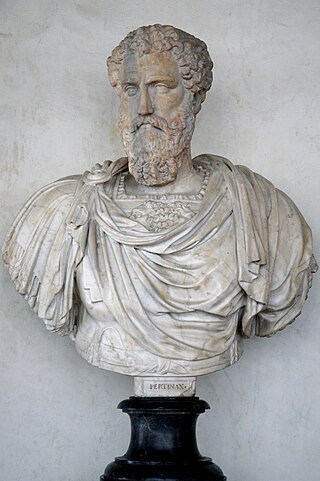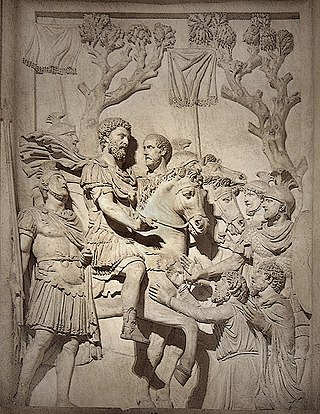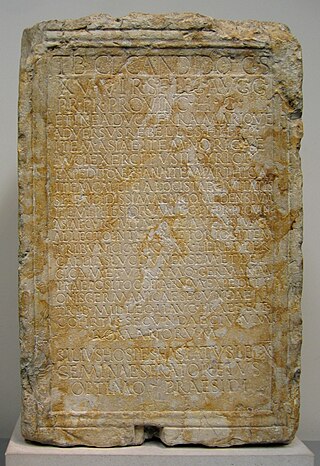Related Research Articles

Lucius Septimius Severus was Roman emperor from 193 to 211. He was born in Leptis Magna in the Roman province of Africa. As a young man he advanced through the customary succession of offices under the reigns of Marcus Aurelius and Commodus. Severus was the final contender to seize power after the death of the emperor Pertinax in 193 during the Year of the Five Emperors.

Commodus was a Roman emperor who ruled from 177 until his assassination in 192. For the first three years of his reign, he was co-emperor with his father Marcus Aurelius. Commodus's sole rule, starting with the death of Marcus in 180, is commonly thought to mark the end of a golden age of peace and prosperity in the history of the Roman Empire.

Gaius Pescennius Niger was a Roman usurper from 193 to 194 during the Year of the Five Emperors. He claimed the imperial throne in response to the murder of Pertinax and the elevation of Didius Julianus, but was defeated by a rival claimant, Septimius Severus, and killed while attempting to flee from Antioch.

Publius Helvius Pertinax was Roman emperor for the first three months of 193. He succeeded Commodus to become the first emperor during the tumultuous Year of the Five Emperors.

Marcus Didius Julianus was Roman emperor from March to June 193, during the Year of the Five Emperors. Julianus had a promising political career, governing several provinces, including Dalmatia and Germania Inferior, and defeated the Chauci and Chatti, two invading Germanic tribes. He was even appointed to the consulship in 175 along with Pertinax as a reward, before being demoted by Commodus. After this demotion, his early, promising political career languished.

Decimus Clodius Albinus was a Roman imperial pretender between 193 and 197. He was proclaimed emperor by the legions in Britain and Hispania after the murder of Pertinax in 193. Initially Albinus cooperated with another contender for the throne, Septimius Severus, but the two turned on each other in 196 and commenced a civil war. Albinus died in battle the following year.

Tiberius Claudius Pompeianus was a politician and military commander during the 2nd century in the Roman Empire. A general under Emperor Marcus Aurelius, Pompeianus distinguished himself during Rome's wars against the Parthians and the Marcomanni. He was a member of the imperial family due to his marriage to Lucilla, a daughter of Marcus Aurelius, and was a key figure during the emperor's reign. Pompeianus was offered the imperial throne three times, though he refused to claim the title for himself.

The Battle of Lugdunum, also called the Battle of Lyon, was fought on 19 February 197 at Lugdunum, between the armies of the Roman emperor Septimius Severus and of the Roman usurper Clodius Albinus. Severus' victory finally established him as the sole emperor of the Roman Empire following the Year of the Five Emperors and immediate aftermath.
Lucius Fabius Cilo, full name Lucius Fabius Cilo Septiminus Catinius Acilianus Lepidus Fulcinianus, was a Roman senator, who was a confidant of Septimius Severus. He held a number of appointments that have been dated to the reigns of Commodus and Severus. He was twice Roman consul: the first time in 193 as a suffect, and the second time as ordinary consul in 204 with Marcus Annius Flavius Libo as his colleague. Cilo is known from numerous inscriptions and appears in the Historia Augusta and the history of Dio Cassius. He married Cilonia Fabia.

The Year of the Five Emperors was AD 193, in which five men claimed the title of Roman emperor: Pertinax, Didius Julianus, Pescennius Niger, Clodius Albinus, and Septimius Severus. This year started a period of civil war when multiple rulers vied for the chance to become emperor.
Cornelius Repentinus was a Roman Senator who was active in the 2nd century AD. He held a number of positions during the reigns of emperors Marcus Aurelius, Commodus and Didius Julianus, which included suffect consul and Urban prefect of Rome.
Quintus Aemilius Laetus was a prefect of the Roman imperial bodyguard, known as the Praetorian Guard, from 191 until his death in 193. He acceded to this position upon the deaths of his predecessors Regillus and Lucius Julius Vehilius Gratus Julianus, by appointment of emperor Commodus. His name suggests that his family received Roman citizenship from Marcus Aemilius Lepidus.
Gaius Julius Erucius Clarus Vibianus was a Roman politician and senator. He was consul ordinarius with Quintus Pompeius Sosius Falco in early 193, during the reign of Pertinax.
Marcus Annius Flavius Libo was a Roman Senator who lived in the second half of the 2nd century and first half of the 3rd century. He was consul ordinarius in AD 204 with Lucius Fabius Cilo as his senior colleague.
Titus Flavius Claudius Sulpicianus was a Roman statesman who served as Senator and Consul suffectus. He unsuccessfully attempted to succeed his son-in-law Pertinax as Emperor in 193.
Gaius Pomponius Bassus Terentianus was a Roman military officer and senator.

Tiberius Claudius Candidus was a Roman general and senator. He played an important role supporting Septimius Severus in the struggle for succession following the assassination of the emperor Pertinax in 193 CE.
The gens Silia was a plebeian family at ancient Rome. Members of this gens are mentioned as early as the fifth century BC, but first to hold the consulship was Publius Silius Nerva, in the time of Augustus. The Silii remained prominent until the time of the Severan dynasty, in the early third century.

Publius Helvius Pertinax the Younger was a Roman politician, suffect consul of 212 AD and son of Emperor Pertinax. After the latter came to power in 193 AD, the Senate wanted to proclaim Pertinax the Younger as Caesar, but the emperor rejected this proposal. Pertinax the Elder was killed on the 88th day of his reign. His son survived and under Septimius Severus became a flamen of his father's cult, and under Caracalla a suffect consul. He was later executed as a possible contender for Imperial power.